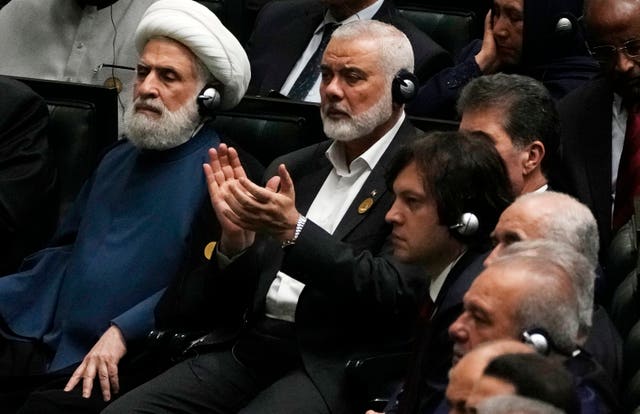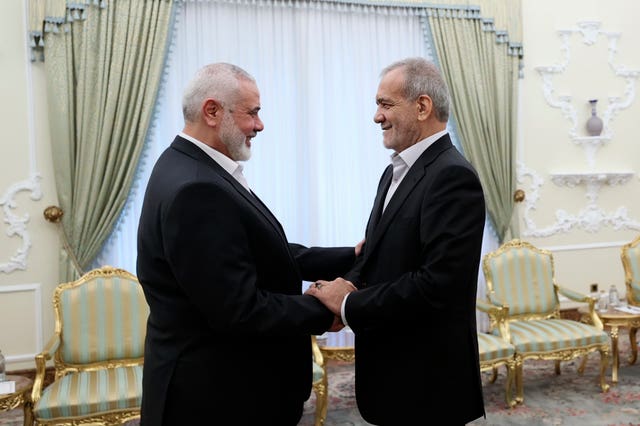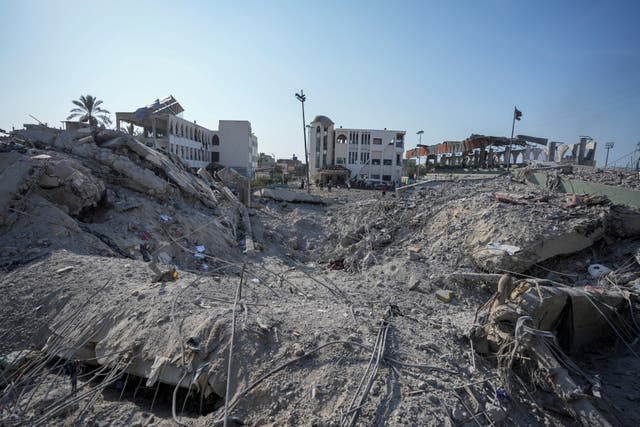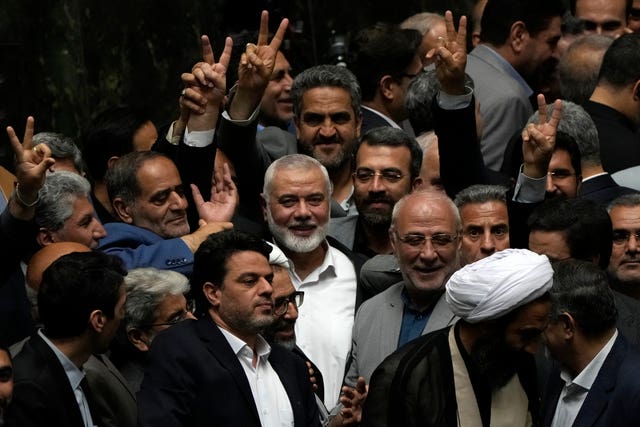Hamas political leader Ismail Haniyeh had lauded October 7 attacks
The 62-year-old leader of the Palestinian militants’ political wing has been killed in an air strike in Iran.

Ismail Haniyeh, Hamas’ supreme leader in exile who topped Israel’s hit list after the militant group’s October 7 attacks, has been killed in an air strike in the Iranian capital at the age of 62.
Hamas said Mr Haniyeh was killed at his residence in Tehran in an Israeli air strike after he attended the swearing-in ceremony of Iran’s new President.
The devastating Israel-Hamas war the attacks set off has become the deadliest and longest in the Arab-Israeli conflict.
More than 39,000 Palestinians have been killed, according to health officials in Gaza.

Mr Haniyeh said in a speech in Iran during the funeral of late Iranian President Ebrahim Raisi in May: “The Al-Aqsa flood was an earthquake that struck the heart of the Zionist entity and has made major changes at the world level.
“We will continue the resistance against this enemy until we liberate our land, all our land.”
Hours after the October 7 attacks, Mr Haniyeh appeared in a video released by Hamas leading prayers with other top Hamas officials.
They thanked God for the success of the attack, which blasted through Israel’s vaunted defences and resulted in the deadliest assault in Israel’s history.
Michael Milshtein, a Hamas expert at Tel Aviv University, said Mr Haniyeh had a commanding role in the group’s foreign policy and diplomacy, but was less involved in military affairs.

“From time to time, Sinwar even laughed and joked: ‘He’s the more moderate, sophisticated leader, but he doesn’t understand anything about warfare.'”
Israel pledged to target all of Hamas’ leaders following the attacks and has gradually worked to fulfil that promise.
Mr Haniyeh was also under the eye of the International Criminal Court, whose chief prosecutor sought arrest warrants against him and two other Hamas leaders, Sinwar and Mohammed Deif, for war crimes and crimes against humanity.
Similar requests were issued for Israeli Prime Minister Benjamin Netanyahu and defence minister Yoav Gallant.
Mr Haniyeh had lived in self-imposed exile in Qatar since 2019 and the threats against him did not prevent him from traveling. He visited Turkey and Iran throughout the war.

His role in Hamas’ leadership also cost him his closest relatives. In April, an Israeli air strike in Gaza killed three of Mr Haniyeh’s sons, after which he accused Israel of acting in “the spirit of revenge and murder”.
Hamas said four of the leader’s grandchildren were also killed as well as his sister in a separate strike last month.
Mr Haniyeh, who was born in Gaza’s urban Shati refugee camp on January 29 1962, joined Hamas when it was founded in 1987. He served as an aide to Ahmad Yassin, the group’s founder, and rose throughout the years until he became its top political leader, replacing Khaled Mashaal in 2017.
He was deeply religious and studied Arabic literature at university. He was known for delivering lengthy speeches using flowery language to his supporters while serving as prime minister in Gaza.

Mr Haniyeh, like thousands of other Palestinians, was detained by Israeli authorities in 1989 for being a member of Hamas and spent three years in jail before he was deported to Lebanon in 1992 with a group of top Hamas officials and founders.
He later returned to the Gaza Strip following the 1993 interim peace accords, which were signed between Israel and the Palestine Liberation Organisation.
Mr Haniyeh assumed the position of prime minister in the Palestinian government after Hamas won legislative elections in 2006. He presided over the gravest crisis in the Palestinian leadership in its history, which continues until today.
Hamas violently overran Gaza in 2007, routing forces loyal to Palestinian President Mahmoud Abbas’ Fatah faction and installing itself as ruler of the tiny coastal enclave, with Mr Haniyeh as prime minister.





